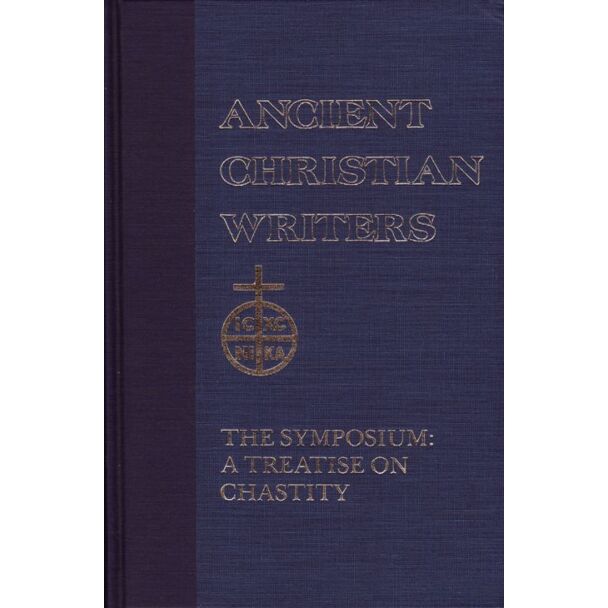The Symposium: A Treatise on Chastity #27
St. Methodius
Translated and Annotated by Herbert Musurillo, S.J.
Translated and Annotated by Herbert Musurillo, S.J.
Publication Data: New York, NY/Mahwah, NJ: Paulist Press, 1958
Format: hardcover
Number of Pages: vi + 249
Dimensions (l × w × h): 22.2 cm × 14.6 cm × 2.3 cm
ISBN: 0‒8091‒0143-2
St. Methodius
Translated and Annotated by Herbert Musurillo, S.J.
No. 27 of Ancient Christian Writers: The Works of the Fathers in Translation
“‘Methodius, otherwise known as Eubulius,’ as Epiphanius refers to him, is one of the most interesting as well as the most mysterious of the Greek Fathers who wrote before the peace of the Church. [...]Methodius’ Symposium, the only authentic work of his that is preserved completely in Greek, has had a profound influence on the stream of ascetical thought in both the East and the West.”
—“INTRODUCTION”
CONTENTS
INTRODUCTION
1. Life
2. Works
1. The Banquet. 2. On Free Will. 3. On the Life of Man as a Rational Creature. 4. Aglaophon. 5. On the Jewish Foods and the Red Heifer. 6. To Sistelius on Leprosy. 7. On the Leech. 8–12. Fragments, Lost Works and Spuria.
3. The Symposium
4. Outline of the Symposium
5. The Doctrines of the Symposium
6. The Text of the Symposium
7. The Possibility of a Later Orthodox Redactor of the Symposium
8. Methodius and the Scriptures
9. Summary
TEXT
Prelude: Eubulion and Gregorion
Logos 1: Marcella. The Place of Chastity in the History of Redemption
Logos 2: Theophila. A Defense of Marriage
Logos 3: Thalia. Methodius’ Christology. The Pauline Doctrine on Virginity
Interlude I
Logos 4: Theopatra. The Flood of Sin
Logos 5: Thallusa. Allegorical Variations on Virginity
Logos 6: Agathe. Chiefly on the Parable of the Wise and Foolish Virgins
Logos 7: Procilla. The Application of the Canticle of Canticles
Logos 8: Thecla. The Ascent of the Soul. Exegesis of Apoc. 12. On Astrology and Its Evils
Interlude II
Logos 9: Tusiane. Allegorical Interpretation of the Feast of the Tabernacles
Interlude III
Logos 10: Domnina. Methodius’ Botanical Exegesis: the Symbolism of Trees
[Logos 11:] The Discourse of Arete. Conclusion of the Contest
Thecla’s Hymn: An Epithalamium on the Wedding of Christ and the Church
Epilogue: Dialogue between Eubulion and Gregorion on the Value of Concupiscence for the Practice of Virtue. The Essence of Virtue
NOTES
To the Introduction
To the Text
INDEX
Format: hardcover
Number of Pages: vi + 249
Dimensions (l × w × h): 22.2 cm × 14.6 cm × 2.3 cm
ISBN: 0‒8091‒0143-2
St. Methodius
Translated and Annotated by Herbert Musurillo, S.J.
No. 27 of Ancient Christian Writers: The Works of the Fathers in Translation
“‘Methodius, otherwise known as Eubulius,’ as Epiphanius refers to him, is one of the most interesting as well as the most mysterious of the Greek Fathers who wrote before the peace of the Church. [...]Methodius’ Symposium, the only authentic work of his that is preserved completely in Greek, has had a profound influence on the stream of ascetical thought in both the East and the West.”
—“INTRODUCTION”
CONTENTS
INTRODUCTION
1. Life
2. Works
1. The Banquet. 2. On Free Will. 3. On the Life of Man as a Rational Creature. 4. Aglaophon. 5. On the Jewish Foods and the Red Heifer. 6. To Sistelius on Leprosy. 7. On the Leech. 8–12. Fragments, Lost Works and Spuria.
3. The Symposium
4. Outline of the Symposium
5. The Doctrines of the Symposium
6. The Text of the Symposium
7. The Possibility of a Later Orthodox Redactor of the Symposium
8. Methodius and the Scriptures
9. Summary
TEXT
Prelude: Eubulion and Gregorion
Logos 1: Marcella. The Place of Chastity in the History of Redemption
Logos 2: Theophila. A Defense of Marriage
Logos 3: Thalia. Methodius’ Christology. The Pauline Doctrine on Virginity
Interlude I
Logos 4: Theopatra. The Flood of Sin
Logos 5: Thallusa. Allegorical Variations on Virginity
Logos 6: Agathe. Chiefly on the Parable of the Wise and Foolish Virgins
Logos 7: Procilla. The Application of the Canticle of Canticles
Logos 8: Thecla. The Ascent of the Soul. Exegesis of Apoc. 12. On Astrology and Its Evils
Interlude II
Logos 9: Tusiane. Allegorical Interpretation of the Feast of the Tabernacles
Interlude III
Logos 10: Domnina. Methodius’ Botanical Exegesis: the Symbolism of Trees
[Logos 11:] The Discourse of Arete. Conclusion of the Contest
Thecla’s Hymn: An Epithalamium on the Wedding of Christ and the Church
Epilogue: Dialogue between Eubulion and Gregorion on the Value of Concupiscence for the Practice of Virtue. The Essence of Virtue
NOTES
To the Introduction
To the Text
INDEX
Write Your Own Review






